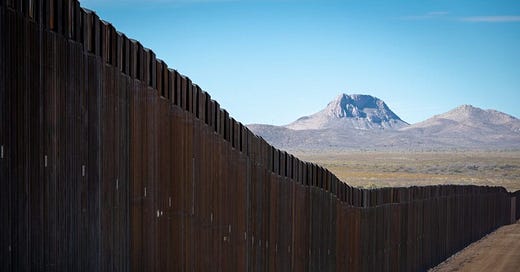As I sit down to write this, our southern border is under siege. It's not a siege of soldiers and tanks, but mainly of fentanyl and a human tide, pouring through the gaps in our border like water through a sieve. This floodgate, notably in Arizona and Texas, has become a gushing artery of issues that the Biden administration seems to watch with a bewildering blend of indifference and inaction.
The specter of fentanyl, a synthetic opioid far more potent and deadly than heroin, looms large over this crisis. This poison flows freely across our porous borders, smuggled in quantities that are as staggering as they are horrifying. Critics see this as a failure, an open invitation to the cartels to continue their deadly trade unimpeded. The volume of fentanyl crossing the border is alarmingly high, a testament to the efficiency of the smuggling networks that operate like clockwork. In recent years, the U.S. Customs and Border Protection has seized record amounts of this deadly drug, with figures reaching into the multi-kilogram range annually. This influx is not just a trickle but a torrent, as the synthetic opioid is compact and potent, allowing smugglers to transport large quantities in small, concealable packages.
The Drug Enforcement Administration reports that just two milligrams of fentanyl can be lethal, meaning that the vast quantities making their way across the border have the potential to kill millions. This stark reality underscores the critical nature of the fentanyl crisis, as the drug's high potency and low production cost make it a lucrative commodity for cartels, fueling the epidemic of overdose deaths plaguing communities across America.
Then there are the people, the masses who surge across the desert sands and Rio Grande, driven by a blend of desperation and hope. Propelled by the push factors of economic disparity, escalating violence, and political instability in their home countries, they seek the pull of the American dream's promise of safety, opportunity, and a better life. Towns along the border, from Yuma to Brownsville, bear the brunt of this human deluge. Their schools, hospitals, and public services groan under the weight of sudden, unplanned-for demand. Families in these towns live in a constant state of uncertainty and fear, their lives disrupted, their security threatened.
Border Patrol agents, those unsung heroes manning the ramparts of our nation’s sovereignty, are stretched to breaking. They are overwhelmed, not just by the numbers they encounter but by the tragic human stories they face daily, the relentless physical and emotional toll, and the Sisyphean task of stemming a tide with little more than their courage and resolve. Their resources are finite, their morale battered, and their pleas for help too often lost in the political cacophony of Washington.
At the heart of this maelstrom is a lack of decisive action from the top. President Biden’s laissez-faire attitude toward the border, encapsulated in his infamous remark that he’d let the border situation "work itself out," strikes many as not just negligent but downright dangerous. This isn’t a problem that will solve itself. It’s a festering wound on the body politic of America, one that requires surgery, not a Band-Aid.
To effectively address this multifaceted issue, a comprehensive approach is necessary. Immigration reform should balance stricter border security with humane policies that offer pathways to citizenship for qualifying immigrants. Such reforms would need to address the legal ambiguities and loopholes that currently hamper effective border management. Moreover, bipartisan policy efforts are essential in crafting long-term solutions that tackle the root causes of migration, such as foreign aid aimed at improving conditions in migrants' home countries, and establishing legal channels for migration to reduce the pressure on the border.
The situation at our southern border is a complex tapestry woven with threads of humanitarian, economic, and security concerns. It's a battleground where the future of America’s identity, safety, and values is being contested every day. The cost is high, in human lives, in resources, and in the very fabric of our border communities. This crisis demands action, resolve, and leadership, calling for a balanced approach that secures the border while also respecting human rights and addressing the factors driving migration. This balanced approach is not just a matter of policy but a reflection of our values as a nation, underscoring the need for solutions that are both effective and empathetic.




